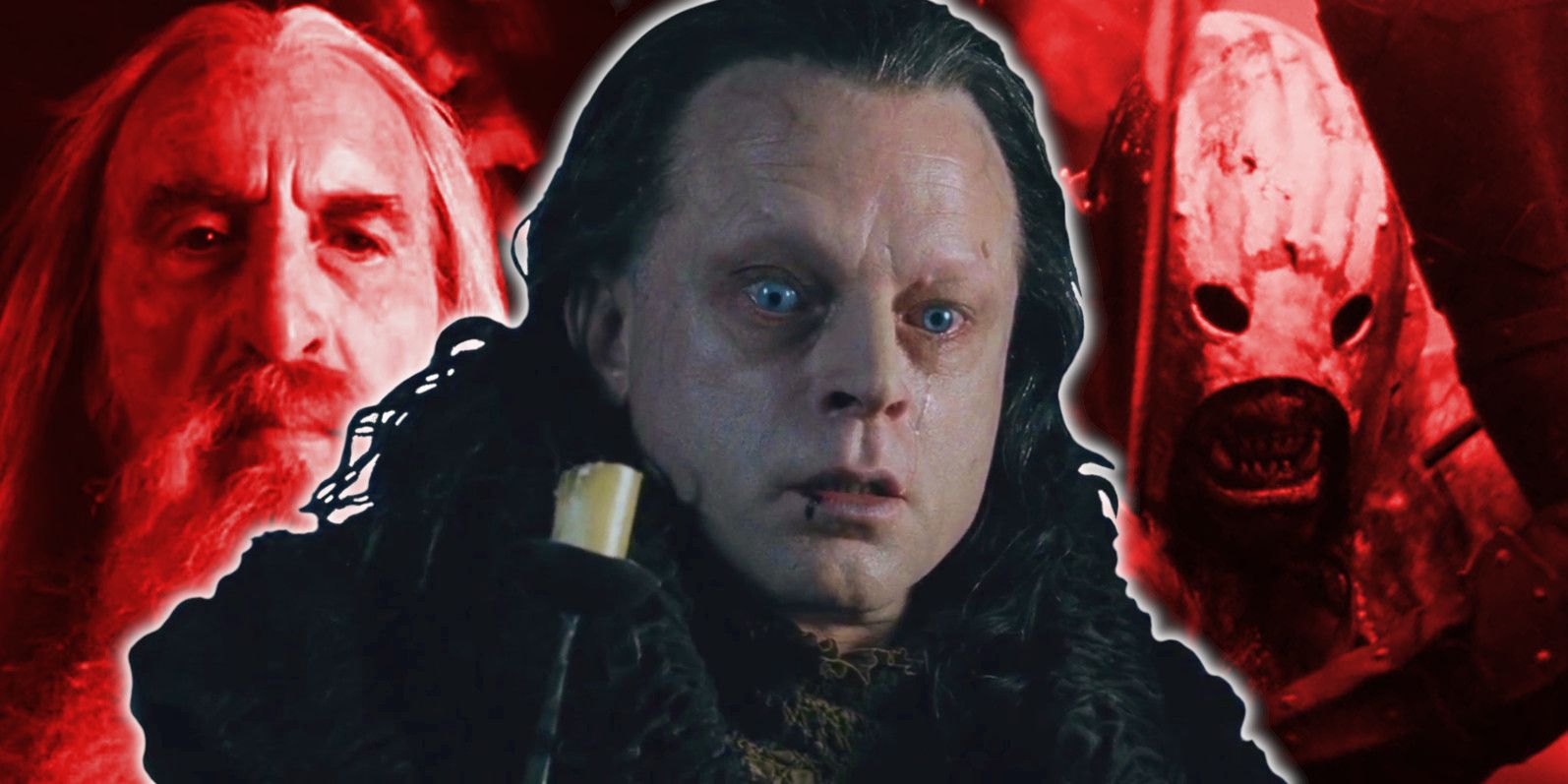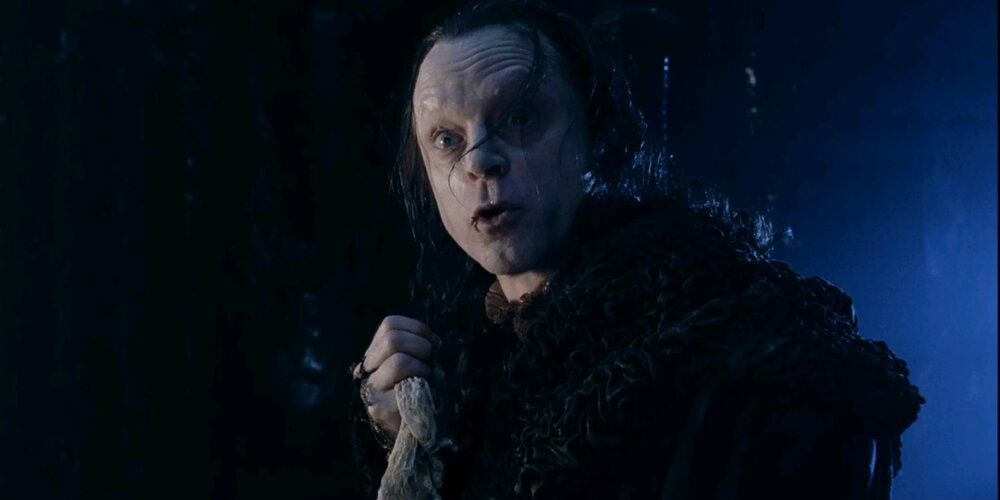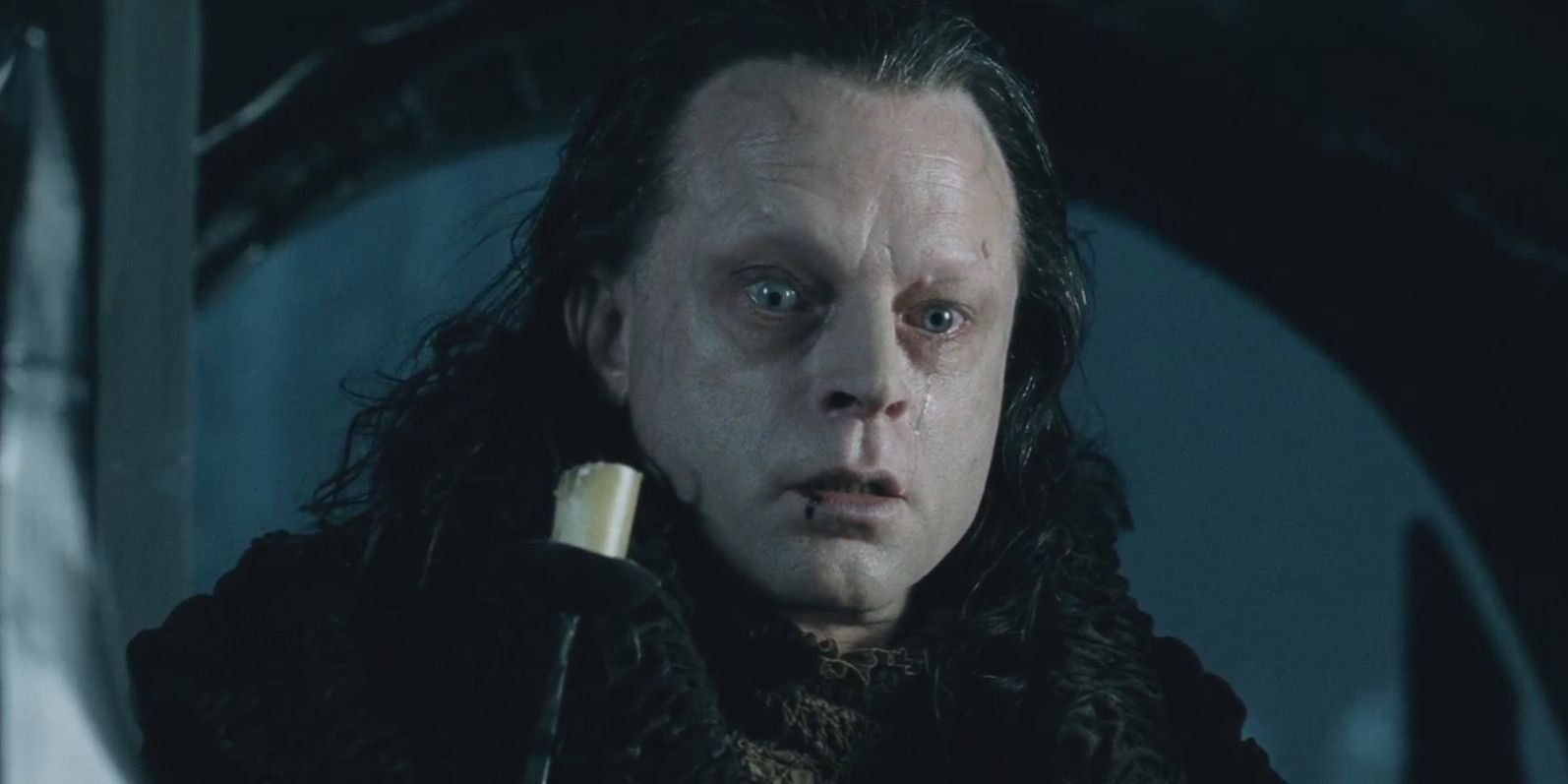
In Peter Jackson‘s The Lord of the Rings: The Two Towers, Saruman attempts to destroy the kingdom of Rohan. At Helm’s Deep, the Rohirrim formed their last line of defense against the White Wizard. Saruman planned to use his blasting-fire to destroy the outer wall of the fortress and massacre those sheltering within. His servant and former spy, Gríma Wormtongue, argued that this was an impossible task. He told Saruman, “Even if it is breached, it would take a number beyond reckoning — thousands — to storm the keep.” Saruman responded, “Tens of thousands.” As Wormtongue protested that there was “no such force” in Middle-earth, a war horn blared. Wormtongue stepped out onto the balcony of Orthanc and beheld the massive legions of Uruk-hai that his master had created. Saruman then gave a speech that roused his minions to war. Wormtongue said nothing, but as he gazed out over the sea of Uruk-hai, a single tear rolled down his cheek.
This detail was not originally in the script; Jackson decided to include it when he learned that Brad Dourif, who portrayed Wormtongue, was able to cry on command. This was an interesting addition, as up to that point, The Two Towers had portrayed Wormtongue as purely evil. He was a dishonest, manipulative coward who abused his modicum of power and showed no remorse for the death and destruction he helped Saruman spread. He even spat at Aragorn when he tried to show him mercy. Fans have interpreted Wormtongue’s tear in many ways, and since this scene did not originate from J. R. R. Tolkien‘s The Lord of the Rings novel, most of the evidence must come from the films themselves. Some theories only heighten Wormtongue’s despicable nature while others humanize the villain.
Wormtongue Was Nothing Compared to Saruman’s Uruk-hai Army
Actor Name
Bradford Claude Dourif
Birthplace
Huntington, West Virginia, United States of America
Birthdate
March 18, 1950
First Acting Role
One Flew Over the Cuckoo’s Nest (1975)
Awards Won
Golden Globe Award for New Star of the Year — Actor (1976), British Academy Film Award for Best Actor in a Supporting Role (1977), Fangoria Chainsaw Award for Best Supporting Actor (1991), Beverly Hills Film Festival Award for Best Actor (2013)
The least generous interpretation of this scene is that Wormtongue sheds a tear of awe or even joy. Such a massive army had never been assembled — at least, not in Wormtongue’s lifetime — so it would have been an overwhelming sight. Saruman was seemingly on the cusp of a major victory, and as his right-hand man, Wormtongue would reap some of the rewards. According to the novel version of The Lord of the Rings, Wormtongue had been serving as Saruman’s spy for at least five years by the time of The Two Towers, so Rohan’s defeat would be the culmination of half a decade of hard work. Yet Wormtongue’s face looked anything but victorious at this moment.
In keeping with Wormtongue’s spineless demeanor, he might have instead shed a tear because he was terrified. Saruman’s Uruk-hai hated the race of Men, so Wormtongue could have worried that they would turn on him. Likewise, he might have feared that his master would dispose of him. If Saruman had tens of thousands of loyal, ferocious soldiers at his command, he had little need for a spy, especially since King Théoden had already caught on to his treachery. The sight of the Uruk-hai army put into perspective how small and insignificant he truly was. However, there is a more generous way to interpret this scene, and it is the most interesting regarding Wormtongue’s characterization in The Lord of the Rings.
Wormtongue Believed the Uruk-hai Were Unstoppable

Wormtongue’s tear could have been a sign that there was some good in him. Neither the films nor the novel delved into Wormtongue’s backstory, but he was seemingly once a genuine advisor to Théoden. Saruman turned him to the side of evil with the offer of treasure and Éowyn‘s hand. Wormtongue likely regretted his actions once he realized that he had reached the point of no return. It is possible that he did not even know the full extent of Saruman’s plan, namely the complete extermination of all Men in Rohan. There were civilians in Helm’s Deep, including children, and the Uruk-hai intended to slaughter them all. Wormtongue had no qualms about killing soldiers, but this might have crossed a line for him. More selfishly, perhaps he was only concerned that the woman of his desire would die in the onslaught.
Wormtongue shedding a tear was his last appearance in The Two Towers, and in the theatrical cuts, it was his last appearance in the entire trilogy. But the extended edition of The Lord of the Rings: The Return of the King included a scene that brought his and Saruman’s story to a climactic end. After the Last March of the Ents, Gandalf and Théoden spoke to Saruman and Wormtongue, hoping they would reveal what they knew about Sauron. Saruman stubbornly refused to cooperate, so Théoden tried appealing to Wormtongue instead: “Gríma! You need not follow him. You were not always as you are now. You were once a Man of Rohan… Gríma, come down. Be free of him.” Before Wormtongue could respond, Saruman scoffed, “Free? He will never be free!” Wormtongue shook his head and muttered “No,” prompting Saruman to insult and slap him. Wormtongue then stabbed Saruman in the back, and Legolas shot Wormtongue, bringing an end to both villains. Though it was mainly personal indignation that spurred Wormtongue’s attack, Théoden’s words had affected him.
Wormtongue’s Tear Added Depth to His Character

Dourif needed to shave his eyebrows for the role of Wormtongue.
Dourif usually spoke in Wormtongue’s English accent even off-camera.
When Théoden actor Bernard Hill first heard Dourif’s actual American accent, he assumed it was fake.
Though the scene of Wormtongue looking out over Saruman’s army and shedding a tear was an invention for Jackson’s film, The Lord of the Rings novel did give some insight into Wormtongue’s regret. He felt that he had no choice but to follow Saruman, even after his defeat. In the chapter “Many Partings” from The Return of the King, he cried, “Poor old Gríma! Poor old Gríma! Always beaten and cursed. How I hate him! I wish I could leave him!” Gandalf told him that he could leave, but Wormongue just “shot a glance of his bleared eyes full of terror at Gandalf” and continued to follow Saruman. Like in the film, he eventually killed Saruman, though it took far more severe indignities to push Wormtongue to his breaking point.
Wormtongue was a surprisingly complex character in The Lord of the Rings. At first, he seemed like a one-dimensional villain. He was evil, and the damage he wrought made it cathartic to see other characters get the best of him, such as when Gimli pinned him to the ground or Théoden’s guards threw him down the stairs of the Golden Hall. Yet the tear he shed upon seeing Saruman’s army and his bout of rage after the Last March of the Events showed his emotional depth. Aside from the Easterlings and Haradrim, he was one of the few ordinary Men who served the forces of evil, as most of The Lord of the Rings‘ other antagonists were spirits or monsters. He suffered at Saruman’s hands, and for a brief moment, he considered redemption. Wormtongue’s tear was a subtle detail that the filmmakers left up to the audience’s interpretation; such nuance was one of the reasons that The Lord of the Rings films became cinematic masterpieces.


